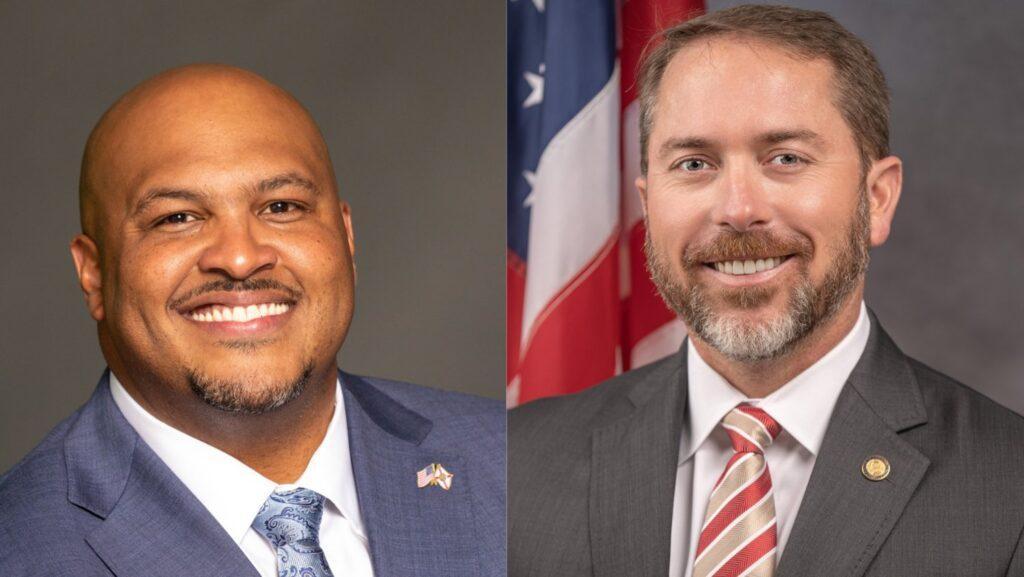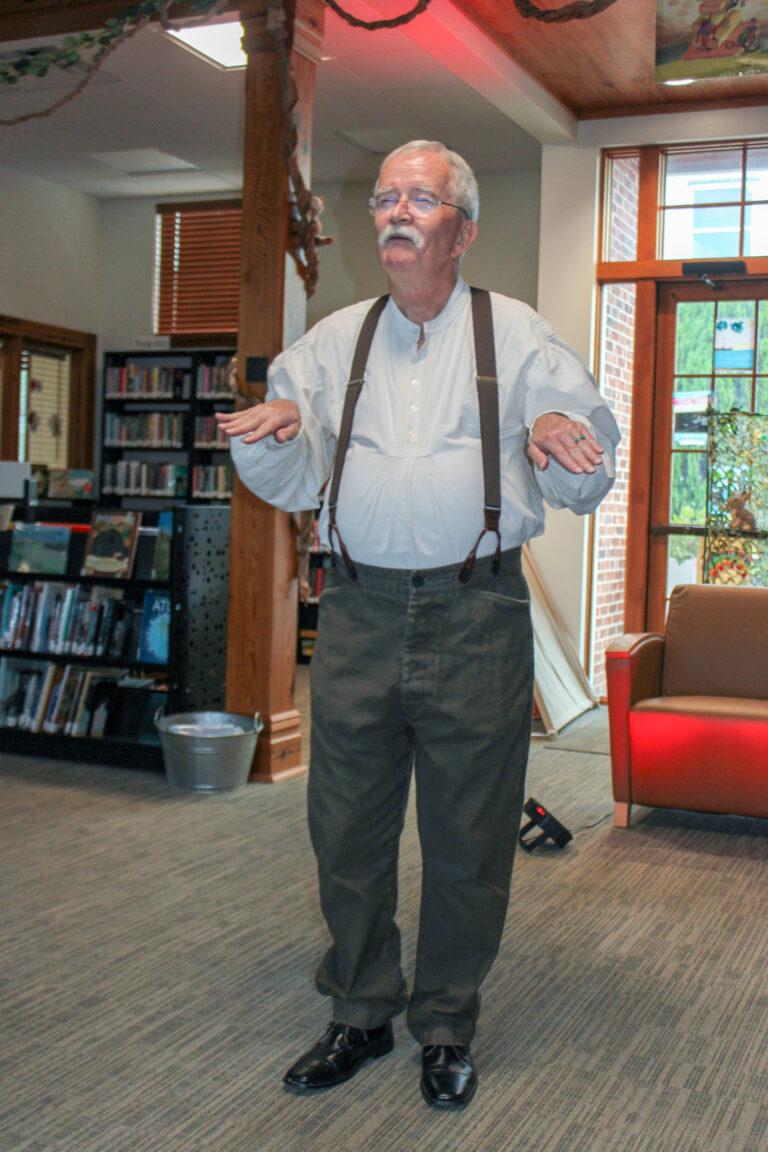Legislators learn of Weems’ ER plans
As legislative delegation hearings go, it was longer and more detailed than usual, as Franklin County’s two representatives in the Florida legislature on Jan. 31 focused on the county’s asks of state government.
Newly elected State Sen. Corey Simon (R-Tallhassee) was part of the proceedings for the first time, with State Rep. Jason Shoaf (R-Port St. Joe), having been in the Florida House for three years, the senior member of the delegation.
“It truly is amazing and I couldn’t be more excited to represent you all in Tallahassee,” said Simon, as he introduced his staff and recounted his committee assignments.
“It is a privilege,” said Shoaf, stressing how sprawling both of the legislators’ districts are.
“My senator friend has 13 counties and some bigger cities,” he said. “This (Florida House District 7) is a rural seat. If you plopped Israel down on the map and it would still be inside my house district.”
Shoaf opened by touting the work being done on the state and local level to help in hardening for and preparing for hurricanes in North Florida “It already has our number; we just don’t know when,” he cautioned.
Shoaf said he plans to address the high-profile issues of jobs, the Apalachicola Bay and affordable housing at the upcoming session, which begins March 7. “Economic development is one of the most important issues here in Franklin County,” he said.
Speaking on behalf of County Commission Chairman Ricky Jones, who was sidelined with the flu, Commission Vice Chair Jessica Ward opened by noting that the county is opposed to a wide-scale revamping of the Workforce boards, which could consolidate services even further than the current make-up.
“It’s going to be disruptive; bigger is not always better,” she said. “Services will be compromised. Bay County and Franklin County are two different ball games.”
Ward urged lawmakers to secure funding to enhance the 60-year-old Weems Memorial Hospital. The county has scaled back original plans to build a new facility, and is now looking to build a new emergency department.
“We’re asking for less square footage, about 14,000 square feet,” she said. “We can add infusion therapy and cardiopulmonary rehab. We do have funding and we can help with that.”
Simon asked about a timetable and Weems CEO David Walker came forward to answer questions.
“We’ve been trying to build since 2015. The county has done a lot of legwork to get funding to build a hospital,” Walker said, noting that there have been several feasibility studies and capital outlay money has built up in the Health Care Trust Fund.
“We decided last year with the rising costs of building it would be impossible to build a new hospital with inpatient services so we’ve started with the emergency department first,” he said.
He said thousands of visitors coming here for events, and during the busy season, add demand on emergency services.
He said a standalone emergency room connected to the front of the hospital could be built at $700 to $1,000 per square foot, so the resulting price tag would be in the neighborhood of $11 million.
“We have $9 million in capital outlay but we don’t want to use all of that,” Walker said. “We have money to get something started this year.”
Clerk of Court Michele Maxwell addressed the legislators, as did a representative of Tax Collector Rick Watson’s office, addressing state issues, but beyond that there was little fanfare from constitutional officers.
When Maxwell referred to her office collecting concealed weapon permit fees, Shoaf made clear he supported the Republican-controlled legislators’ move to adopt what it calls “constitutional carry,” which would do away with such permits.
“You shouldn’t be paying a tax to carry a weapon,” he said. “We plan to get rid of that.”
Ward noted that the county jail needs new heavier gauge galvanized windows, and the recently reconstituted Lanark Village Volunteer Fire Department is seeking a new fire truck.
In terms of tourism dollars, Ward said that the county would like to see a lifting of the 10 percent cap on spending for beach projects. “This is a detriment to small fiscally constrained counties,” she said.
The county has said little about a bill Shoaf has championed which would allow some lodging tax dollars to be used at a coastal county’s discretion to go for public safety, such as police protection, traffic control, first responders and lifeguards.
School Superintendent Steve Lanier made an appeal for the state to restore sparsity funding, which was created to help districts with limited tax bases but which was done away with several years ago. Such funding would have brought in an additional $900,000 to the district last year.
“We couldn’t get sparsity traction in the Senate,” said Shoaf. “We’re going to team up and get after it this year.”
Both Apalachicola Mayor and Carrabelle Mayor Brenda La Paz outlined their cities’ needs from the legislature this session.
The legislators also heard from several citizens, including Ron Karlin, who is advocating for a Convention of States that would give citizens greater option to bypass Congress and address such things as “term limits for politicians and bureaucrats… fiscal responsibility… and rein in federal overreach.”
Denise Butler, speaking on behalf of husband Cliff, who heads the county’s land trust, stressed that “workforce housing is critical for the future of our community. Affordable housing is available but our teachers don’t have any options. It’s becoming an even more critical problem. I cannot tell you what a struggle it is, when they come in here and can’t find a place to live.”
Shoaf said he would like to see a relaxation of policies that keep state and federal lands protected from development.
“It’s atrocious how much they (the government) own here and it chokes off growth and possibility,” he said. “Hundreds and thousands of acres are held in preservation that are high and dry and not of critical environmental concern. It makes the hair on my neck stand up.”
Shoaf also heard from a representative of budding oyster aquaculturist J.P. Barber, who said access to his leases in Alligator Harbor has become a problem and needs to be addressed. Shoaf appeared well-versed in the issue and said he would monitor it when it is addressed in upcoming management plan discussion.
Wayne Williams, from the Seafood Work and Waterman’s Association, spoke out on the issues confronting the bay.
At the end of the meeting, Shoaf and Simon voted to support a bill that will ensure that the Eastpoint Water and Sewer District is not dissolved June 1. The EWSD had been slated to dissolve when because of its origins, was tied into a bill in the legislature that would dissolve the special district created for Walt Disney World.





Meet the Editor
David Adlerstein, The Apalachicola Times’ digital editor, started with the news outlet in January 2002 as a reporter.
Prior to then, David Adlerstein began as a newspaperman with a small Boston weekly, after graduating magna cum laude from Brandeis University in Waltham, Massachusetts. He later edited the weekly Bellville Times, and as business reporter for the daily Marion Star, both not far from his hometown of Columbus, Ohio.
In 1995, he moved to South Florida, and worked as a business reporter and editor of Medical Business newspaper. In Jan. 2002, he began with the Apalachicola Times, first as reporter and later as editor, and in Oct. 2020, also began editing the Port St. Joe Star.